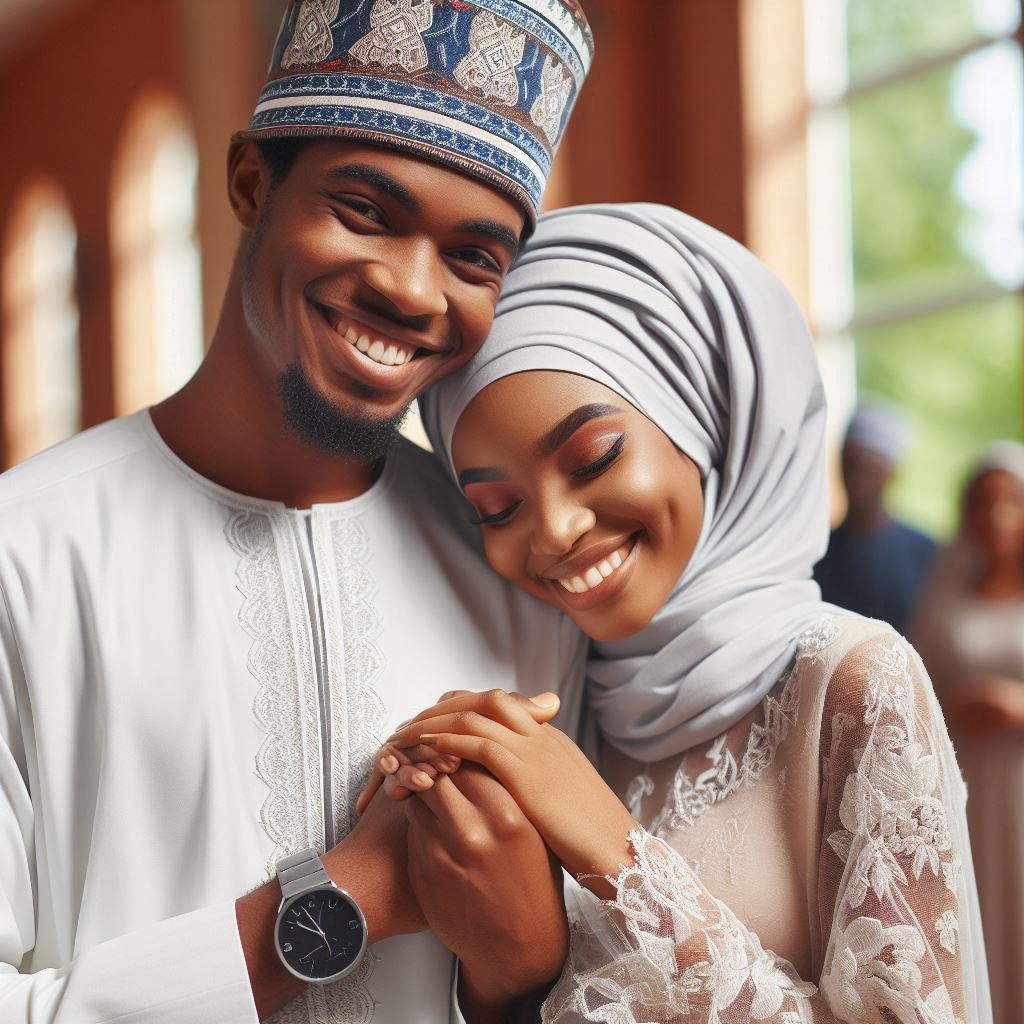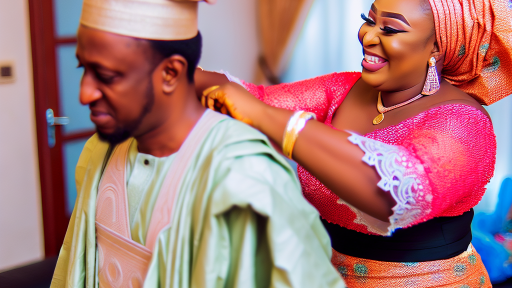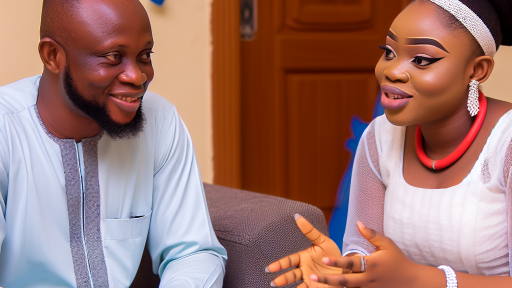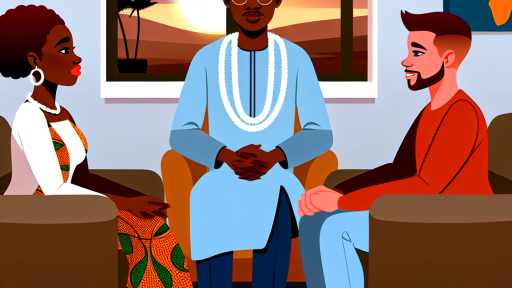Introduction
Faith and religion in marriages plays a vital role in Nigerian society, where marriage holds a significant place.
It symbolizes unity, family progression, and societal values.
In this context, strong marriages contribute to the community’s overall stability and growth.
Nigerian marriages often reflect rich cultural traditions and shared responsibilities.
Faith and religion play crucial roles in the formation and sustenance of these unions.
They provide moral guidance and a shared belief system that strengthens the bond between spouses.
This connection often fosters mutual respect and understanding.
Couples who share religious beliefs may find spiritual support during challenging times.
The purpose of this blog is to explore how faith and religion contribute to building strong Nigerian marriages.
We will delve into the ways that spiritual practices and shared values create a robust foundation for lasting relationships.
Understanding this relationship can help couples navigate the complexities of married life.
The Cultural Context of Marriage in Nigeria
Marriage is a vital cultural institution in Nigeria.
It goes beyond the union of two individuals.
It signifies the joining of families and communities.
In Nigeria, marriage plays a key role in social stability and cultural continuity.
Cultural Significance of Marriage
Every ethnic group in Nigeria has unique marriage customs.
These customs reflect the cultural values of each group.
Marriage often includes rituals, ceremonies, and celebrations that honor tradition.
In Nigeria, marriage is not simply a bond; it is a communal event.
- Marriages are often arranged by families.
- Bridal prices are common, symbolizing respect for the bride’s family.
- Ceremonies can last for several days, involving various cultural activities.
Through these practices, marriage reinforces social ties and responsibilities.
Families invest heavily in wedding celebrations to showcase their values.
This communal approach fosters a sense of belonging and loyalty.
Diverse Cultural and Religious Backgrounds
Nigeria is home to over 250 ethnic groups.
Each group has distinct beliefs and practices surrounding marriage.
Among the major groups, the Yoruba, Igbo, and Hausa stand out.
- Yoruba: Marriage often includes elaborate ceremonies.
The engagement ceremony, known as “Iku Aiye,” holds great importance.
Families participate in negotiating terms, with respect for elders emphasized. - Igbo: The Igbo marriage process includes a traditional ceremony called “I do.”
This ceremony requires paying bride price and involves both families.
The wedding reflects the community’s values and the couple’s commitment. - Hausa: Among the Hausa, marriages may include polygamy.
The rite of “Khadija” is significant, where the groom’s family presents gifts.
The emphasis is on respect for tradition and family ties.
Religious diversity adds another layer to marriage practices in Nigeria.
While Christianity and Islam are prevalent, indigenous beliefs also play a role.
This mix influences how marriages are celebrated.
Couples often incorporate religious elements into their ceremonies.
The Historical Role of Religion in Shaping Marital Customs
Religion profoundly impacts the understanding of marriage in Nigeria.
Traditionally, many communities looked to local deities and ancestral spirits for guidance.
Marriage was seen as a means to gain blessings and maintain favor with these entities.
With the advent of Western education and missionary activities, Christianity began to shape marital customs.
This shift introduced new ideas about love, companionship, and mutual respect.
The concept of marriage as a sacrament gained traction among Christian communities.
Similarly, Islamic teachings have a strong influence on marriage among Muslims.
Islam emphasizes the importance of marriage as a partnership.
It teaches mutual respect, love, and support.
The Quran outlines guidelines for marital conduct and obligations.
Faith as a Pillar of Strong Marriages
Faith plays a crucial role in cultivating strong marriages in Nigeria.
Couples often depend on their religious beliefs for guidance.
They find solace in prayer and shared spiritual activities.
- Shared Values: Faith fosters a sense of shared values and purpose.
- Moral Guidance: Religious teachings provide ethical frameworks for resolving conflicts.
- Community Support: Religious communities offer support systems, helping couples during difficult times.
Sharing faith can create a deeper emotional bond between partners.
Couples who pray together often strengthen their connection.
They build a foundation of trust and understanding.
Cultural and Religious Conflict in Marriage
In Nigeria, interfaith marriages can present challenges.
Couples from different religious backgrounds must navigate these complexities.
They often encounter pressure from family and community members.
Despite these challenges, many couples successfully blend their traditions.
They create unique ceremonies that honor both faiths.
Compromise and open communication become essential tools in these relationships.
The Interplay of Culture and Religion
The cultural context of marriage in Nigeria is rich and diverse.
It reflects a tapestry of traditions, beliefs, and practices.
Faith and religion serve as powerful forces in shaping these customs.
Ultimately, whether traditional or modern, the essence of marriage remains the same.
It is about building strong families and communities.
Faith and culture intertwine, offering couples shared values and support.
In this way, Nigeria’s marital landscape continues to thrive and adapt.
Faith as a Foundation for Marriage
Faith forms a robust foundation in Nigerian marriages.
Couples who share similar beliefs often enjoy a deeper connection.
This shared faith fosters intimacy and understanding between spouses.
When both partners practice the same religion, they can nurture their relationship more effectively.
Shared beliefs create meaningful bonds.
They help couples navigate challenges together.
For instance, prayers can unite them during difficult times.
Couples often find strength in communal worship.
Faith also provides a shared perspective on family and values.
Setting Values and Expectations
Faith plays a crucial role in shaping values in marriage.
Couples who embrace the same religious principles often have aligned expectations.
These expectations include mutual respect, love, and fidelity.
They establish frameworks for communication and conflict resolution, guided by their beliefs.
In many Nigerian cultures, faith influences roles within marriage.
Men and women often engage in roles that align with their spiritual teachings.
These gender-specific roles may enhance partnership dynamics, creating a sense of balance.
For example, many faiths promote the idea of love and sacrificial leadership from the husband.
This promotes a loving and supportive environment for the wife and family.
Furthermore, religious teachings shape attitudes toward fidelity.
They instill a commitment to honor vows taken before God.
These principles serve as a reminder of the weight of marriage vows.
Couples may find solace in scriptures that encourage love and unity.
Such teachings reinforce their dedication to each other.
Practical Examples of Faith in Marriage
Many couples rely heavily on their faith in various ways.
They draw inspiration from spiritual leaders and community teachings.
Let’s explore some personal stories that showcase the power of faith in marriages:
- Joyce and Michael: They attribute their successful marriage to shared church activities.
Regular attendance strengthens their bond and encourages open communication.
They pray together every morning, creating a positive start to their day. - Amara and Kelechi: They faced financial hardship early in their marriage.
Instead of growing apart, they leaned into their faith.
Their church community rallied around them, offering support and encouragement.
This experience deepened their reliance on one another and on God. - Chinedu and Ify: They attend couples’ retreats organized by their faith community.
These retreats provide them with tools and strategies for a harmonious relationship.
They discuss their conflicts openly and learn to appreciate each other’s perspectives.
These examples illustrate how faith enriches marriage.
Couples can rely on their spiritual teachings to maintain a strong relationship.
Systems of support within faith communities often prove invaluable.
Couples feel connected not only to each other but also to a broader community.
The Importance of Prayer
Prayer emerges as a vital practice in strengthening marriages.
Couples often turn to prayer for guidance and support.
It enables them to express their hopes and fears openly.
Through prayer, they deepen their relationship with God and each other.
Such spiritual communication fosters intimacy.
When partners pray together, they share their innermost thoughts.
This creates an atmosphere of vulnerability and trust.
As they seek divine intervention, they cultivate patience and perseverance in their marriage.
Nigerian couples often find solace in prayers during conflicts.
Instead of arguing, they may retreat to prayer as a first step.
This practice promotes reflection and understanding before discussing issues.
Couples can discuss conflicts more calmly after praying together.
Faith as a Source of Hope
Couples can turn to their faith during challenging times.
In moments of despair, religious faith offers reassurance.
It instills hope that challenges are temporary and can be overcome together.
This belief fosters resilience and encourages couples to work towards solutions.
Moreover, many couples derive strength from scripture.
Phrases from religious texts may provide comfort and guidance.
For example, verses about love and compassion remind partners of their commitment.
Such reminders can rekindle feelings of affection and commitment.
Community support further reinforces this hope.
Faith organizations often provide counseling and mentorship for couples.
These resources empower couples to seek help and learn new coping strategies.
Faith acts as a powerful binding force in Nigerian marriages.
It fosters shared beliefs that create a strong connection between spouses.
Faith not only sets values but also aligns expectations in relationships.
Couples who rely on their spiritual resources often overcome challenges effectively.
Personal stories illustrate the transformative power of faith.
Through shared prayer, couples build intimacy and resilience.
Faith becomes a source of hope, guiding partners through life’s challenges.
In essence, the role of faith in building strong marriages cannot be understated.
It is an essential element that encourages love, respect, and unity in Nigerian households.
Read: Building a Solid Foundation for Long-Lasting Marriages in Nigeria
Religious Institutions and Support Mechanisms
Nigerian religious institutions play a vital role in shaping marriages.
They influence the values and beliefs surrounding marriage.
Many people consult their faith leaders during important life decisions.
Churches and mosques serve as sanctuaries for spiritual guidance and support.
These institutions also equip couples with tools for a successful union.
Overview of religious organizations and their roles in marriage preparation
Religious organizations in Nigeria, including churches and mosques, provide essential resources.
They help couples understand the sanctity of marriage.
These organizations emphasize the importance of faith as a foundation for a lasting relationship.
- Marriage ceremonies: Religious officiants conduct marriage ceremonies that bind couples spiritually.
- Workshops: Many institutions hold workshops to educate couples on marital responsibilities.
- Community building: Religious groups foster a sense of belonging and community among couples.
- Resource centers: They often serve as information hubs for relationship management.
Successful marriage preparation requires understanding expectations and responsibilities.
Faith-based organizations facilitate this understanding through various programs.
The significance of pre-marital counseling in churches and mosques
Pre-marital counseling has become an essential part of marriage preparation.
Many churches and mosques mandate it to ensure couples are ready for marriage.
The counseling addresses common topics that affect marriages.
- Conflict resolution: Couples learn effective communication strategies.
- Financial management: Premarital counseling helps couples discuss finances openly.
- Family dynamics: Couples explore how to manage relationships with extended families.
- Expectations: Counseling encourages couples to express their marital expectations.
These sessions often create a safe environment for discussion.
Faith leaders guide couples in addressing sensitive topics.
They promote honesty and transparency, which are critical for a strong marriage.
Case studies of religious communities that promote marriage enrichment programs
Several religious communities in Nigeria have pioneered successful marriage enrichment programs.
These initiatives strengthen relationships by offering support and resources to couples.
- The Family Life Programme (Anglican Church): This initiative promotes healthy marriages through workshops and seminars.
Participants learn about emotional intimacy and conflict resolution. - The Islamic Marriage Workshop: Focusing on Islamic tenets, this program emphasizes family roles and responsibilities while improving communication.
- Catholic Marriage Encounter: This program offers retreats that strengthen couples’ relationships through shared experiences and discussions.
- Redeeming the Family Program (Redeemed Christian Church of God): This initiative addresses specific issues facing modern families.
It combines spiritual teachings with practical advice.
Each of these programs sees positive outcomes.
Couples report improved communication skills and deeper emotional bonds.
Participants often express gratitude for the sense of community they gain during these programs.
Overall, religious institutions provide essential support networks for couples.
They emphasize the importance of faith in fostering enduring relationships.
By participating in these organizations, couples can strengthen their marriages through education and shared experiences.
In short, faith and religion serve as a robust framework for Nigerian marriages.
Religious organizations contribute significantly to marriage preparation and enrichment, promoting healthy relationships.
By engaging with these institutions, couples fortify their unions, ensuring a harmonious and lasting marital bond.
Such support systems can enhance couples’ understanding of the responsibilities that marriage entails.
As Nigerian marriages evolve, the role of faith remains pivotal.
Read: Building a Strong Foundation of Trust in Nigerian Marriages

Conflict Resolution through Faith
Faith plays a crucial role in communication and conflict resolution strategies among Nigerian couples.
When disagreements arise, relying on religious beliefs can provide a strong foundation for navigating conflicts.
These principles can guide couples toward understanding and harmony.
Communication through Faith
Effective communication is essential in resolving conflicts.
Faith helps couples communicate with kindness and respect.
Here are several ways faith influences communication:
- Active Listening: Faith encourages listening as a form of respect.
Couples learn to hear each other without interruption. - Open Dialogue: Religious teachings advocate for honesty.
Couples feel safe expressing feelings and opinions. - Positive Language: Faith inspires couples to use uplifting and encouraging language.
This minimizes misunderstandings and promotes emotional safety.
By incorporating these communication strategies, couples can foster an environment where conflict resolution becomes constructive rather than destructive.
They cultivate a space where both individuals feel understood and valued.
Religious Teachings on Forgiveness
Forgiveness is a core value in many religions, including Christianity and Islam.
Religious doctrines encourage couples to forgive one another, recognizing human fallibility.
This focus on forgiveness can significantly enhance conflict resolution.
Here are a few teachings:
- Christian Teachings: The Bible teaches about the importance of forgiveness.
Verses like Ephesians 4:32 emphasize being kind and forgiving. - Islamic Teachings: The Quran highlights forgiveness as a virtue.
Surah Al-Baqarah speaks about the rewards of forgiving others. - Common Values: Most religions stress the importance of reconciling relationships.
These values serve as a reminder of love over conflict.
By embracing these teachings, couples can find it easier to forgive and rebuild after conflicts.
They see the value in resolving disputes and restoring harmony.
Anecdotes of Conflict Resolution
Real-life experiences illustrate the impact of faith on conflict resolution in marriages.
Couples who rely on their beliefs often find meaningful ways to overcome challenges.
Here are some personal anecdotes reflecting this sentiment:
- John and Mary: When John and Mary faced financial stress, resentment brewed between them.
They turned to prayer and sought guidance from their pastor.
The pastor advised them to communicate openly about their fears and aspirations.
Through heartfelt conversations, they reconnected and strengthened their partnership. - Aisha and Ibrahim: Aisha and Ibrahim struggled with differing parenting styles.
Their disagreements led to tension.
They consulted their religious leaders for advice.
Drawing from religious teachings, they established a set of shared values.
This approach fostered mutual respect and understanding, allowing them to parent in unity. - Chinelo and Emeka: During a period of emotional distance, Chinelo and Emeka sought the support of their church community.
They attended marriage workshops and found strength in shared faith.
This experience fueled their commitment to each other and deepened their bond.
These stories reveal how couples leverage their faith to navigate challenges.
By focusing on their religious beliefs, they built resilience and improved their conflict resolution skills.
The Power of Prayer
Prayer serves as a powerful tool in resolving conflicts.
It creates a space for reflection and healing.
Couples often find comfort and guidance through prayer during difficult times.
Here’s how prayer impacts conflict resolution:
- Internal Peace: Prayer helps individuals find inner calm.
When one feels centered, it’s easier to approach conflicts rationally. - Shared Intentions: Couples who pray together cultivate unity.
They align their focus on common goals and desires for their relationship. - Divine Guidance: Many couples seek divine intervention through prayer.
They ask for wisdom to navigate complex issues with grace and love.
By integrating prayer into their daily routine, couples strengthen their relationship.
They increase their capacity for compassion and understanding.
Community Support
Faith communities often provide substantial support in navigating marital challenges.
Couples can lean on their community for guidance, advice, and encouragement.
Here are some ways community involvement benefits couples:
- Mentorship: Faith communities often offer mentorship programs.
Experienced couples provide insights and support for younger couples navigating conflict. - Shared Experiences: Couples can share their challenges during group studies.
Hearing others’ experiences normalizes struggles and inspires hope. - Accountability: Being part of a faith community encourages accountability in relationships.
Couples feel motivated to uphold their commitments.
Through community, couples find a supportive network that uplifts them during conflicts.
They realize they are not alone in their struggles, fostering resilience and unity.
Faith plays a vital role in conflict resolution among Nigerian couples.
It encourages communication, forgiveness, and community support.
Couples who integrate their beliefs build stronger marriages.
They develop the necessary skills to navigate challenges with grace and resilience.
By relying on their faith, these couples enhance their relationships and grow together.
Faith transforms conflicts into opportunities for growth, making their bonds more profound and resilient.
Read: Key Foundations for a Successful Marriage in Nigeria
Rituals and Traditions Anchored in Faith
In Nigeria, rituals and traditions play a significant role in marriages.
Across various religions, these practices create a sense of shared identity and purpose among couples.
The bonds formed during these rituals often reflect deep emotional and spiritual connections.
They contribute to lasting unions by anchoring couples in their faith.
Common Marital Rituals in Various Nigerian Religions
Different religions practiced in Nigeria have unique marital rituals.
These rituals often highlight cultural heritage and reinforce the couple’s commitment.
Here are some common marital rituals observed in Nigeria:
- Traditional Wedding Ceremonies: Many Nigerian cultures emphasize traditional wedding ceremonies.
These ceremonies feature colorful attire, music, and dance, showcasing rich cultural heritage.
Families of the couple often come together to bless the union. - Church Weddings: Christian couples often participate in church weddings.
These ceremonies include readings from the Bible, prayers, and blessings from the pastor.
Couples exchange vows in the presence of family and friends. - Islamic Nikah: In the Islamic faith, the Nikah is the marriage contract.
This sacred agreement is often conducted in the presence of witnesses.
It emphasizes mutual consent between the bride and groom. - Ritual Offerings: Many Nigerian cultures incorporate ritual offerings during wedding ceremonies.
Couples may present gifts to their families and ancestors.
Such acts honor family traditions and seek blessings.
The Emotional and Spiritual Connection Between Couples
Rituals anchored in faith foster deep emotional and spiritual connections between couples.
By participating in these rituals, couples often find renewed purpose in their relationship.
Here are some ways these rituals strengthen the emotional and spiritual bonds:
- Shared Experience: Engaging in marital rituals provides couples with shared experiences.
These moments create lasting memories and enhance their understanding of each other. - Spiritual Growth: Participating in faith-based rituals often encourages spiritual growth.
Couples may engage in prayers or discussions about their faith, fostering deeper connections. - Community Support: Marital rituals often involve both families and communities.
This communal support reinforces the couple’s commitment, creating a network of love and guidance. - Expressing Love and Respect: Many rituals emphasize love and respect.
By actively engaging, couples express their dedication to one another and to their faith.
Contributing to the Longevity of Marriages
Marital rituals contribute significantly to the longevity of Nigerian marriages.
They provide couples with frameworks that guide their relationships through challenges.
Here are several ways these rituals promote lasting unions:
- Conflict Resolution: Rituals often incorporate teachings about forgiveness and understanding.
Couples equipped with these principles tend to navigate conflicts more effectively. - Commitment Ceremony: Many rituals serve as commitment ceremonies.
They remind couples of the vows they took and the promises they made to one another. - Celebration of Milestones: Regular participation in rituals helps couples celebrate significant milestones.
Whether through anniversaries or religious observances, these celebrations reinforce their bond. - Guidance from Elders: Many rituals involve the counsel of elders.
The wisdom shared helps couples learn from previous generations, strengthening their resolve. - Spiritual Intercessions: Couples often seek prayers and blessings from religious leaders.
These spiritual intercessions provide comfort during difficult times.
Rituals and traditions anchored in faith significantly enrich Nigerian marriages.
They foster emotional and spiritual connections between couples, leading to stronger unions.
By embracing these rituals, couples can navigate life’s complexities with a deeper understanding of each other and their spirituality.
The impact of these traditions extends beyond individual relationships and enhances the fabric of Nigerian society.
In this way, faith and rituals remain pivotal in strengthening the bonds of marriage across Nigeria.
Read: The Changing Face of Marriage in Nigeria: Trends and Insights
The Influence of Community and Religious Leaders
In Nigeria, faith and community play key roles in shaping marriages.
The interplay of spirituality and communal support significantly impacts marital success.
Couples often find strength in the guidance provided by their religious leaders.
Mentorship from these leaders can provide direction during challenging times.
By fostering a supportive environment, communities enhance marital resilience.
Roles of Community Support
The importance of community in marriage cannot be overstated.
Community support crucially contributes to the stability of marital relationships.
Below are specific ways communities influence marriages:
- Encouragement: Communities offer encouragement to couples, promoting a healthy marriage culture.
- Conflict Resolution: Local groups often mediate disputes, helping couples find common ground.
- Shared Values: Communities uphold shared morals and values that strengthen marital bonds.
- Social Activities: Regular gatherings enhance bonds between couples, enriching their relationships.
- Support Networks: Families and friends provide essential emotional support during stressful periods.
These aspects of community life nurture marriages in profound ways.
When couples feel supported, they are less likely to face difficulties alone.
This sense of belonging fosters a strong atmosphere for marital growth.
The Role of Religious Leaders
Spiritual leaders serve as pivotal figures in building healthy marriages.
They assume various roles that impact couples positively.
Here are critical functions they fulfill:
- Moral Guidance: Religious leaders offer teachings that emphasize commitment and love.
- Mediation: They facilitate discussions between couples, encouraging open communication.
- Counseling Services: Many leaders provide counseling to navigate complex marital issues.
- Teaching Tools: Leaders share resources, including books and workshops, to help couples grow.
- Community Engagement: They encourage couples to participate in community activities, fostering stronger relationships.
Through these roles, spiritual leaders help couples maintain healthy relationships.
Their teachings on love and commitment resonate deeply within the Nigerian context.
This guidance forms the backbone of marital success.
Mentorship for Couples
Spiritual leaders frequently serve as mentors for couples.
This mentorship can be invaluable as couples navigate the complexities of marriage.
Mentorship provides couples with practical advice and spiritual insights.
Below are ways leaders mentor couples:
- Personalized Guidance: Leaders offer tailored advice based on the couple’s unique circumstances.
- Workshops and Seminars: Many leaders host workshops aimed at enhancing marital skills.
- Pre-marital Counseling: Leaders help couples prepare for marriage through comprehensive counseling.
- Support During Life Changes: Leaders guide couples through significant life transitions, such as parenthood.
- Encouragement of Open Communication: Mentorship fosters dialogue, helping couples express emotions healthily.
This mentorship not only benefits couples but also enhances overall community bonds.
A community enriched with healthy marriages creates a positive ripple effect.
Such an environment fosters mutual respect and understanding.
Testimonials from Couples
Many Nigerian couples have experienced transformations through guidance from their spiritual leaders.
Here are a few testimonials that highlight this impact:
“Our pastor helped us through a tough period.
His advice on communication saved our marriage.”- Chika and Olumide
“The workshops at our church taught us invaluable skills.
We now approach conflicts differently.”- Sarah and Michael
“Our imam has been a blessing.
He provided us with tools to strengthen our foundation.”- Amina and Ibrahim
These testimonials illustrate how spiritual leaders can impact marriages profoundly.
They show that community-oriented guidance fosters stronger bonds between partners.
Couples’ success stories inspire others and reinforce the power of community.
The influence of community and religious leaders on Nigerian marriages is significant.
Their support and guidance create a solid foundation for couples.
A community that values marriage cultivates an environment conducive to emotional and spiritual growth.
Spiritual leaders, as mentors, guide couples through life’s challenges and transitions, enhancing their relationships.
Through shared experiences and teachings, they create a nurturing atmosphere that fosters strong marriages.
In essence, the synergy between community support and spiritual leadership plays a vital role in marital success.
Couples who embrace these resources often enjoy fulfilling, lasting marriages.
The path to healthy, happy marriages begins with a supportive community and wise spiritual guidance.
Challenges and Misinterpretations of Faith in Marriage
Faith plays a crucial role in many Nigerian marriages.
However, it can also present unique challenges.
These challenges often stem from religious differences, misinterpretations, and rigid beliefs.
Couples need to navigate these challenges to strengthen their relationship.
Potential Challenges from Religious Differences
Many Nigerian couples come from different religious backgrounds.
This diversity can enrich a marriage but can also cause friction.
Here are some common challenges couples face:
- Conflicting Values: Different religions often promote different values, leading to disagreements.
- Family Expectations: Extended families may pressure couples to conform to their religious traditions.
- Child-Rearing Decisions: Couples may struggle with how to raise their children in a multi-faith environment.
- Social Isolation: Couples may face social stigma from communities that disapprove of interfaith marriages.
- Worship Practices: Differing views on religious practices can create tension during joint worship.
The Risk of Rigid Interpretations of Faith
While faith can be a source of strength, rigid interpretations can harm marital bonds.
When partners insist on strict adherence to their beliefs, it can lead to problems.
Here are some risks associated with inflexible faith interpretations:
- Resentment: One partner may feel resentful if their beliefs are dismissed or marginalized.
- Power Struggles: Opposing viewpoints can create power struggles within the marriage.
- Communication Breakdown: Misunderstandings often arise when partners cannot discuss their faith openly.
- Emotional Distance: Rigid beliefs can lead to emotional separation instead of unity.
- Divorce Risks: Intolerance of differing beliefs can escalate to serious relationship breakdowns.
Finding Balance and Harmony in Faith-Based Marriages
Couples can strive for balance and harmony despite challenges from faith.
Understanding and compromise are crucial for success.
Here are suggestions for integrating differing faiths into a marriage:
- Open Communication: Establish a culture of open dialogue regarding religious beliefs and values.
- Mutual Respect: Respect each other’s beliefs, even when disagreements arise.
- Shared Values: Focus on common values that transcend religious differences.
- Joint Worship: Find ways to worship together that respect both partners’ beliefs.
- Counseling: Consider premarital or marital counseling to address religious differences.
- Compromise: Be prepared to compromise on certain religious practices or traditions.
- Involve Family: Discuss faith openly with family members to build a supportive network.
- Set Boundaries: Create boundaries concerning religious discussions, particularly with external parties.
- Continuous Learning: Educate yourselves about each other’s faiths to foster understanding.
- Focus on Togetherness: Participate in activities that promote unity and shared experiences.
In a nutshell, while faith can enrich Nigerian marriages, it can introduce challenges.
Couples must navigate these challenges with empathy and understanding.
By focusing on communication, respect, and compromise, married couples can build a strong foundation.
As partners work together to overcome differences, they cultivate a bond that is resilient and fulfilling.
Conclusion
Faith and religion significantly influence Nigerian marriages.
They offer couples a shared foundation built on spiritual values.
Trust in a higher power fosters resilience during challenging times.
Additionally, shared religious practices strengthen emotional and social bonds.
Couples often participate in communal worship, enhancing support from their religious communities.
This support nurtures connections and promotes accountability in marriages.
Furthermore, faith encourages effective communication, allowing couples to resolve conflicts amicably.
Integrating spiritual beliefs into daily life fosters mutual respect and compassion.
Couples who pray together cultivate emotional intimacy and understanding.
This shared spiritual journey becomes a strong pillar in their relationship.
Embracing faith also invites moral guidance, reinforcing commitment and fidelity.
Such core values are essential in upholding the sanctity of marriage.
By aligning their relationship with their spiritual beliefs, couples create a loving and stable environment.
As we reflect on these points, it’s clear that faith plays a vital role in nurturing strong marriages.
It serves as an anchor, guiding couples through life’s ups and downs.
Therefore, it’s essential for couples to actively embrace their faith.
This call to action invites all couples to anchor their relationships in spiritual values.
Taking this step can lead to profound growth both individually and together.
By fostering a strong bond grounded in faith, couples can overcome challenges and achieve lasting happiness.
Incorporating faith into marriage is not merely beneficial; it’s transformative.
Strong marriages thrive when grounded in shared spiritual beliefs and practices.
Embrace your faith to build enduring marital ties that weather any storm.




